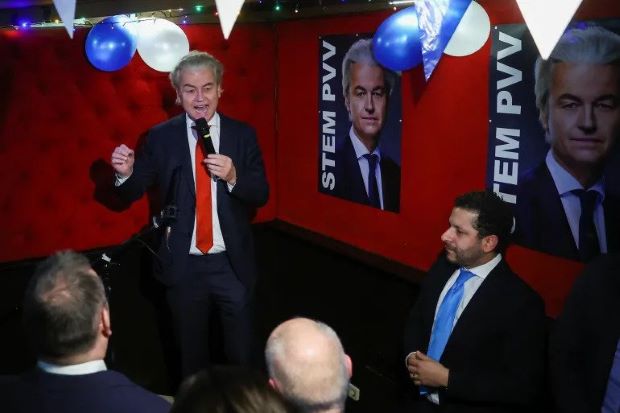Far-right Wilders seeks partners after election earthquake
By Richard Carter with Jan Hennop in Enschede
THE HAGUE – Far-right firebrand Geert Wilders urged his shaken political rivals on Thursday (23) to find common ground to govern the country, after a bombshell election win that reverberated around the Netherlands and Europe.
His PVV (Freedom Party) won 37 seats in parliament, more than doubling his share from the last election and outstripping opponents, according to near-complete results.
A left-wing bloc trailed far behind on 25 seats, with the centre-right VVD on 24, a catastrophic result for the party of outgoing Prime Minister Mark Rutte.
Wilders, 60, now has the daunting task of trying to form a working coalition, courting rivals that categorically ruled out serving in a PVV-led government before the vote.
“The voters have spoken. The seats are fixed. Now it is important that we look for things we can agree on,” said Wilders, toasting his election success with a glass of champagne.
The unexpected win prompted immediate congratulations from fellow far-right leaders in France and Hungary but will likely raise fears in Brussels – Wilders is anti-EU and wants a vote on a ‘Nexit’ to leave the bloc.
Although he softened his anti-Islam rhetoric during the campaign, the PVV program pledges a ban on the Quran, mosques and Islamic headscarves and Muslim community leaders in the Netherlands were quick to voice concern.
“I woke up this morning with an unpleasant feeling. Actually also in shock,” Habib el Kaddouri from the SMN association of Moroccan Dutch, told AFP.
“Some people are scared, others uncertain about their future, about what the result means for their citizenship or place in Dutch society,” he added.
However, Burak Cen, a 40-year-old taxi driver, said he didn’t vote but would have voted for Wilders.
“I think he deserves a chance,” he told AFP.
“I honestly think he’s just trying to drum up votes with his propaganda about mosques and Muslims. But otherwise what he says about the Dutch and poverty is right,” added Cen.
Addressing cheering supporters in The Hague after exit polls, Wilders doubled down on his anti-immigrant rhetoric, saying the Dutch had voted to stem the “tsunami” of asylum-seekers.
He later told reporters he wanted to be “prime minister for all Dutch” and would “work hard with other parties” to form a coalition.
But it is not clear how he can scrape together the 76 seats he needs for a majority in the 150-seat parliament.
Former European Commissioner Frans Timmermans, whose Green/Labour bloc came in second, immediately ruled out cooperation, saying it was now their job to “defend democracy” in the country.
Anti-corruption champion Pieter Omtzigt, whose New Social Contract party scored 20 seats, seems certain to play a role and indicated he was “available” for talks, admitting they wouldn’t be easy.
Dilan Yesilgoz, who led the centre-right VVD to a disappointing 24 seats, was coy on election night, saying Wilders would have to see if he can forge a coalition.
She first opened the door to Wilders joining a VVD-led government but has stressed she would not serve under him.
“It will be entirely up to the VVD,” said Sarah de Lange, Professor of Political Pluralism at the University of Amsterdam.
“A big issue will be who will be prime minister because with Wilders as prime minister, the Netherlands has an impossible situation internationally,” she added.
The Dutch lurch to the far-right comes after Italy elected Giorgia Meloni as prime minister.
Hungary’s nationalist Prime Minister Viktor Orban hailed “winds of change” after the exit poll, while France’s Marine Le Pen cheered his “spectacular performance”.
And although Wilders pledged he would be prime minister “for all the Dutch”, his anti-Muslim rants in the past have earned him the sobriquet “Dutch Trump” — also a reference to his dyed, slicked-back hairstyle.
He was found guilty of discrimination in 2016 after leading a crowd chanting for “fewer” Moroccans in the Netherlands and has previously likened the Koran to Adolf Hitler’s “Mein Kampf”, saying both books should be banned.
With trademark Wilders rhetoric, the PVV manifesto says: “Asylum-seekers feast on delightful free cruise-ship buffets while Dutch families have to cut back on groceries.”
A “binding referendum” would be held on a “Nexit” — the idea of the Netherlands leaving the EU. The PVV also calls for an “immediate halt” to development aid.
Dutch media were left agog by the margin of Wilders’ victory.
“No one expected this, not even the winner himself,” said the Trouw daily. Even the usually unexcitable NOS public broadcaster called it a “monster victory.”
The Financieele Dagblad said the result “turns politics in The Hague on its head” while the NRC daily described it as a “right-wing populist revolt that will shake the Binnenhof to its foundations”, referring to the government quarter in The Hague.
– Agence France-Presse



Comments are closed, but trackbacks and pingbacks are open.